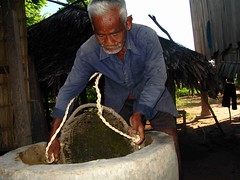Agriculture - Online Education Options for Career Training
The agriculture business delivers all types of foods such as meat and milk to everyone in society. Students can learn about crop and livestock farming by studying the industry through online agriculture schools and colleges. Online training can be pursued at several degree levels allowing students to enter their desired career.
The industry has seen a significant growth in technology use in recent years, which makes completing an education extremely beneficial if not imperative for interested students. Online training incorporates many fields to prepare students for professional work. Biology and chemistry are focused on to prepare students to understand plant promotion and livestock manufacturing. Students are also taught how to integrate new concepts with existing ones to better maintain the business. Many career opportunities are available to students that earn a degree. Some possible career options include:
Agricultural Technician Ranch Manager Greenhouse Manager Agricultural ProfessorStudents can enter these careers and more after completing the correct degree program. Online education options for career training in agriculture include an associate's, bachelor's, or master's degree program.
Students that complete an associate's degree program will gain a foundation in agriculture. Most programs prepare students to become technicians in the field by teaching them how to correctly operate the equipment and machines used for farming. The business of agriculture and understanding soil composition is also highly focused on. Common courses taken at this level of education could include:
Agriculture Chemicals Crop ScienceStudents can expect to understand the hazards of the business and how to promote safety on the job. Livestock and heavy machinery are key areas that are studied in a safety course. Other areas explored may include pesticides, the nature of soils, and ecosystems.
Bachelor's degree programs give students the most career opportunities upon completion. Multiple concentration areas can be entered that focus on areas such as agricultural business management or industry marketing. Programs typically emphasize specific parts of the field like food production, soil science, and plant cultivation. Common coursework that can be found in all concentration areas may include:
Microeconomics for Agriculture Livestock Biometrics Agriculture ResearchCourses help students understand the chemical and biological make up of soil, plant growth, and crop performance. This wide knowledge base allows students to pursue careers in management, technology, and business.
Students that continue education by completing a master's degree program have the opportunity to step into careers where they conduct research or teach others about agriculture. Students explore many areas, which include courses in biological engineering, organic agriculture, and agribusiness. Other online course topics that may be examined include:
Horticulture Agriculture TechnologyStudents are able to step into careers in areas that include government, science, management, and engineering. Soil composition specialists and agricultural policymakers are some career possibilities for students that complete training at the master's degree level.
Online education allows students to work from home and enter their desired career. Enrolling in an accredited online college that offers agriculture is the first step to entering a satisfying career. Full accreditation is awarded by agencies like the Distance Education and Training Council (http://www.detc.org/) to programs that offer a quality education.
DISCLAIMER: Above is a GENERIC OUTLINE and may or may not depict precise methods, courses and/or focuses related to ANY ONE specific school(s) that may or may not be advertised at PETAP.org.
Copyright 2010 - All rights reserved by PETAP.org.
Renata McGee is a staff writer for PETAP.org. Locate Online Agriculture Schools and Colleges as well as Campus Based Agriculture Schools and Colleges at PETAP.org, your Partners in Education and Tuition Assistance Programs.
Article Source: http://EzineArticles.com/?expert=Renata_McGee
